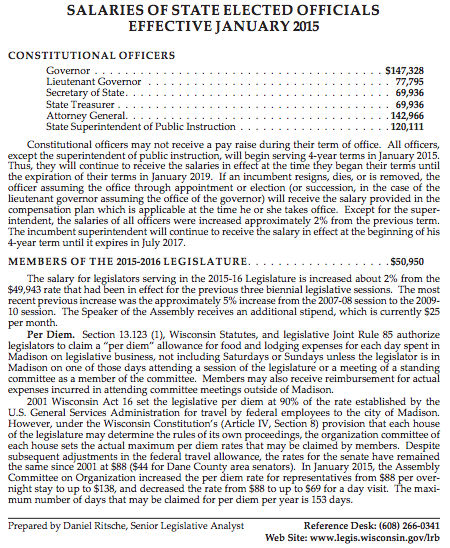Controversy Over Assembly Members Per Diems
Is the 56% increase in legislators' daily expenses "outrageous" or overdue?

A Legislative Reference Bureau analysis of compensation for state elected officials was recently updated to include the new per diems.
In 2012, state Assembly leaders proposed raising the per diem payments for members who come to the Capitol on official business. The idea drew fire — one conservative blog called it “dumb, dumb, dumb” for lawmakers to “jack up their own pay” while pushing austerity elsewhere — and was quickly dropped.
But in January, the Assembly swiftly hiked these payments for lawmakers who travel to Madison and stay overnight, from $88 to $138. That’s a 56 percent spike in these payments, provided whether or not expenses at this level are actually incurred.
Not surprisingly, as before, the reaction from some quarters was harsh. In a letter to the editor in the Milwaukee Journal Sentinel and Wisconsin State Journal, Oak Creek resident Wayne Meyer called the higher per diems “unconscionable,” saying it “borders on criminal.”
Matt Rothschild, new executive director of Wisconsin Democracy Campaign, a nonpartisan watchdog group, is also irate.
“It’s outrageous that the first item of business they took up is lining their own pockets,” Rothschild says. “These are the same legislators who are so hostile to increasing the minimum wage and so eager to make people on food stamps get drug-tested.”
The measure passed an Assembly committee, which is all that was needed to take effect, on Jan. 8, the day after it became public. The vote was unanimous, with the committee’s five Republicans and three Democrats joining in a rare show of bipartisanship.
Per diems are no small expense. In the past two-year session, state lawmakers claimed nearly $1.9 million in these payments. This averages out to more than $7,000 per lawmaker per year. These payments are on top of salaries, which have also just increased for members of the 2015-16 Legislature, to $50,950.
But there is an “on the other hand,” starting with the fact that per diem rates and legislative pay have remained stagnant in recent years.
The maximum $88 per diem had not risen since 2001. Adjusted for inflation, based on the Consumer Price Index, it would now be $118 — and lawmakers paid $44,223 in 2001 would be making $59,000.
While a few states have no per diems, about three dozen pay more than $88, and half of those top $138, according to the National Conference of State Legislators.
Rothschild, for one, is unmoved, saying cheaper rooms are available on East Washington Avenue, a Madison main artery: “I don’t think it would kill the legislators to drive five miles out on East Wash and get a hotel room, like normal people do.”
Assembly Speaker Robin Vos, who claimed more than $19,000 in per diems in 2013-14, has said the changes were tailored to be “cost-neutral.” While the level of reimbursement increased for those who stay overnight, it fell from $88 to $69 for those who don’t. Assembly Minority Leader Peter Barca, D-Kenosha, called the new rates “more equitable.”
Curiously, per diems for members of the state Senate remain at 2001 levels: $88 a day for lawmakers outside of Dane County, $44 a day for the rest.
Myranda Tanck, spokeswoman for Senate Majority Leader Scott Fitzgerald, R-Juneau, said members there did not raise a concern about the current rates. She noted that “Assembly session days have tended to span later into the evening on a more regular basis than (those) in the Senate, requiring more frequent overnight stays for some members in that chamber.”
In 2013-14, Fitzgerald claimed the highest per diems, at $30,712, followed by Barca, at $26,224. Of course, lawmakers like these in leadership positions must be in Madison more often. Lucky them.
Bill Lueders is the Money and Politics Project director at the Wisconsin Center for Investigative Journalism (www.WisconsinWatch.org). The Center produces the project in partnership with MapLight.
The Center collaborates with Wisconsin Public Radio, Wisconsin Public Television, other news media and the UW-Madison School of Journalism and Mass Communication. All works created, published, posted or disseminated by the Center do not necessarily reflect the views or opinions of UW-Madison or any of its affiliates.
-
Legislators Agree on Postpartum Medicaid Expansion
 Jan 22nd, 2025 by Hallie Claflin
Jan 22nd, 2025 by Hallie Claflin
-
Inferior Care Feared As Counties Privatize Nursing Homes
 Dec 15th, 2024 by Addie Costello
Dec 15th, 2024 by Addie Costello
-
Wisconsin Lacks Clear System for Tracking Police Caught Lying
 May 9th, 2024 by Jacob Resneck
May 9th, 2024 by Jacob Resneck






















Juneau is only 45 miles from Madison. What the hell is Scott Fitzgerald spending $31,000 in one year on? Doesn’t sound very fiscally conservative.
PMD, the way the system currently works, they receive the full per diem for any day they are in Madison and do anything even resembling work. Being close to Madison, it actually makes sense that he might just keep the office there rather than a home district office and a capitol office. Admittedly, 349 days is a lot (which is why he’s the highest), but per diems do not reflect actual cost. It’s all or nothing for any given day.
Is that what he does, keep only an office in Madison? And yes 349 days does sound like a lot. $31,000 sounds like a lot.
It seemed more polite than speculating other reasons you’d want to stay in a hotel in Madison more often than needed?
The federal per diem rates for the Madison area are up to $172 for meals and lodging (peaks during college football season, it seems). So even the new rate is just over “roughly half” of what the feds would provide. The old rate that Fitzgerald was (and still does) receive is just over proper half of what the feds provide.
Ha yes that was more polite. Honestly I was not suggesting that. And “roughly half.” Nice. I’m enjoying all the flexibility and opportunity that phrase provides.
Why is the lower rate only for legislators in Dane County? Lots of employees commute much further than that every day all year long; it’s not like the legislator didn’t know where the job was going to be when they ran for office (or maybe they really didn’t, based on some of the intelligent discourse coming out of Madison these days).
Anyone within 90 miles of the Capitol should be on their own for daily expenses, travel and lodging if needed. A legislator from Janesville or Waukesha can drive home after work just like normal people. Don’t like it – get a different job.
just lazily glancing at the article the document at the head says that the maximum days a per diem can be claimed is only 153 days. I wonder how Fitz was able to expense nearly $31k.
This is their method of getting full-time pay for a part-time job.
Both the source data and the article point out that this is for the 2013-2014 legislative term, which is a two year period. The source makes it a little more clear that this covers more than 365 days by listing the 2014 alone numbers (and because Erpenbach claimed 464 days in the same period, albeit at the lower Senate Dane county rate)
Also, it’s not something that gets expensed. It’s a flat rate. A day was worth $88 no matter what it actually cost him.
As for Big Al’s logic, this is why they’re trying to move to a split system that provides more if lodging is necessary. You’re never going to get rid of the per diem completely, but this at least moves it toward something a bit more equitable. Though I hope no one points out to Big Al that there’s a mileage compensation on top of the per diem. He might lose it.
Kyle – are you some sort of shill for the legislature? Spare me your claims of “equity”; each one is paid $50k a year for part-time work. I know people who are paid a lot less for full-time work each year, and they have to cover their own travel expenses out of their salaries. Or other people who’s employers reimburse mileage but at a rate lower than the Federal rate. They can claim unreimbursed job expenses on the individual tax returns; of course that’s only for amounts over 2% of their AGI.
Elected officials can lead by example and pay their “fair share”; they’re forcing all other state employees to do it. Maybe they could work a few more hours each day just like they’re asking the UW faculty to do.